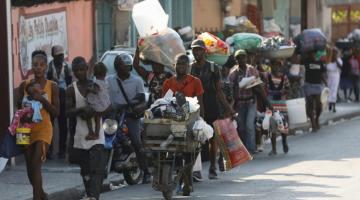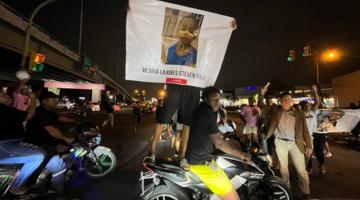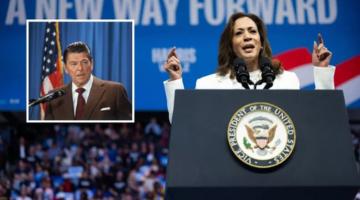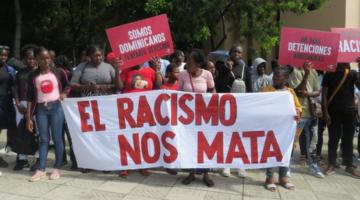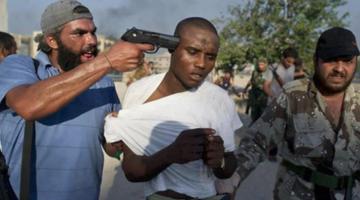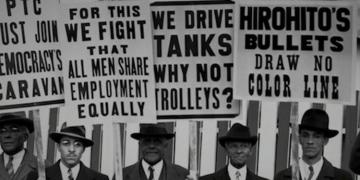Another twenty-year anniversary is the World Conference Against Racism (WCAR) that took place in Durban, South Africa between August 31, and September 8. The George W. Bush administration walked out of that meeting and the Obama administration boycotted the 10th anniversary. BAR contributor and editor, Ajamu Baraka delivered a speech in Paris on the meaning of Durban almost two decades ago that we believe is as relevant today as it was then.
Introduction:
The World Conference Against Racism, Racial Discrimination, Xenophobia and Related Intolerance (WCAR) was a watershed conference for a number of reasons. Coming at the end of a decade-long series of gatherings of global civil society sponsored by the United Nations, the WCAR represented a continuation of a progressive trend, which brought thousands of activists together to participate in the NGO forum of a UN gathering and to participate, in a much-limited manner, in the official State proceedings. However, from the time that the WCAR was announced, it also became clear that this conference would be different.
The explosive nature of the WCAR process became apparent at the first world preparatory meeting of activists and State representatives in Geneva in 1999. The issues that surfaced at that meeting and at the various regional preparatory meetings in the run up to the Durban Conference sparked an intense worldwide debate that exposed, in a more fundamental way than any other United Nations sponsored conference, the ideological fault lines that separate the Global North and South. However, three days after the close of the Durban Conference and well before a full exploration of the Durban experience could take place, the world’s attention was diverted to New York and Washington DC to witness the spectacle of the world’s greatest superpower under deadly attack.
In this discussion, I will examine the meaning and implications of Durban and the attack on 9/11 from a specific African American point of view. This is a point of view informed by three decades of anti-racist, anti-imperialist struggles based in the Southern United States, which is also referred to as the Black Belt. This is the region where millions of Africans found themselves - after having been transported to North America to work land that had been stolen from the indigenous people. It is a region today where, despite what some have describe as the greatest internal migration in human history when millions of African Americans moved to the North of the country to escape the ravages of racial totalitarianism and economic bondage, one can still find the majority of the African American population. This is a region where, in some states, African Americans comprise close to 80% of the prison and jail populations, where thousands of men, women and children walk the streets homeless and where infant mortality rates mirror infant mortality rates in most so called “third world” nations. This is also where millions are still dependent on state subsidies, lack access to medical care and adequate education and, as the events in the state of Florida represent, are still not able to fully exercise their democratic right to vote.
Before I continue, however, I would like to point out that my remarks do not represent the views or positions of any of the organizations of which I am a member or for which I work. In this essay, I posit three interrelated assumptions. Firstly, I suggest that the issues raised during the WCAR process posed the most serious threat to Northern ideological hegemony since the advent of the anti-colonial struggle in the immediate post World War Two period. Secondly, I argue that these issues illuminate the fundamental contradiction between North and South. Not only was the aggressive undermining of the WCAR process by the United States and its European allies predictable but it portends the strategies that will be employed in the face of future United Nations’ sponsored gatherings of global civil society where NGOs have an opportunity to impact global political discourse. Lastly, I believe that the 9/11 attacks were ultimately a reactionary event that provided a convenient opportunity for these same forces, which attempted to undermine Durban to not only divert attention from the issues raised there, to build a new census among right wing forces globally to wage a struggle against all oppositional forces in the name of fighting terrorism. I conclude with some suggestions regarding the challenges that face the global movement for social justice.
The meaning and issues of Durban:
The discussions leading to Durban and at Durban represented a mature understanding of the link between history and current realities. While the US administration and its allies desperately pleaded for the conference to ignore events in the past and to focus instead on present realities and future possibilities, delegations from around the world correctly understood that the history of land expropriations and genocide in the Americas, slavery and the worldwide European colonial project structured and determined current political economic and socio-cultural realities.
African American activists from the Black Belt went to the conference with a specific agenda. This was to highlight the issues that affected the African American working class and to link these issues to those that linked the anti-racist struggles in the US with the anti-racist and anti-globalization struggles worldwide. Some of the specific issues that were discussed and linkages made between activists from the Southern part of the US and activists from the Global South included: the systematic exploitation of African American, Latino and immigrant labor of all nationalities in the US; the criminalization of Black and Latino youth and their disproportionate incarceration; racist immigration and refugee laws; environmental racism; and the superexplotation of women of color and the very contentious issue of reparations.
Beginning with the first WCAR world preparatory meeting in Geneva, reparations as one possible remedial mechanism to address the consequences of the European slave trade emerged as a source of controversy that threaten the very survival of the conference. Led by African Americans who brought a rich history of struggle around this issue, reparations for the sins of slavery were placed on the world agenda for discussion. The result was a firestorm of controversy and political intrigue. The US government and many governments in Europe initially caught by surprise by this issue quickly recovered and used their collective strength to attempt to remove the issue from serious consideration. However, the historical chord that this issue struck with African NGOs and African government delegations and eventually non-African NGOs and governments created a force too powerful to be easily suppressed. At the first PrepCom and subsequent gatherings, the reparations discussions were broadened out to include not only the issue of slavery but the full legacy of colonialist exploitation in Africa, Asia, Latin America, the Middle East, the Caribbean, and the islands of the Pacific.
In Durban, delegates from the South posed a very simple question: since it is clear to anyone not deluded by the ideology of white supremacy that the wealth of the North was arrived at by the systematic looting of the South’s land, labor, people, and resources for centuries, are not the nations of the South due restitution for this criminal assault? And how did the North respond? Instigated and supported by the US government, Northern nations stated in unequivocal terms that not only was the legacy of slavery and colonialism not relevant, but also there would not be any mention of these issues in the final Declaration and Program of Action. As Linda Burham from the Women’s Resource Center eloquently points out “this was not simple recalcitrance. It was an arrogant denial of the consequences of the past in order to justified and preserve the unequal and exploitative relations between peoples and nations in the present and well into the future.”
Another interesting process emerged in the run up to Durban and at the conference itself. A reframing of struggles took place. Struggles for indigenous rights, caste, workers struggles, environment, and various anti colonial struggles were reframed in racial terms. This was not mere opportunism but reflected a progressive conceptual shift which illuminated the racial dynamics that have always been present but not developed for various reasons. The downplaying of race can be attributed to the pre-1989 tendency among left theories to either de-emphasize racial and ethnic phenomenon or confuse it. However, the discussions in Durban indicated that some progress had been made to emancipate discussions on racial dynamics from the constricting and distorting influences of leftist dogma.
The critique coming out of Durban was a blow to white supremacist ideology. This ideology posited that the material superiority of the white North was reflection of the North’s cultural, and implicitly, racial superiority. However, for most the delegates from the South, the military conquest and subsequent exploitative economic relationship between the North and South that resulted in the transfer of wealth from the South to the North was placed at the center of analysis to explain the current disparities between the rich North and the impoverished South. Issues from the rights of migrant workers to the treatment of the Dalits of India were placed within the context of the global fight for racial equality and global justice. Indeed, what Durban represented was the centering of anti-racism within the anti-globalization struggle. For if the discussions around reparations revealed anything, they revealed that the origins, development, and contemporary expressions of capitalism could not be understood in abstraction from racial dynamics. But because of that and the fact that the issues that surfaced during the WCAR process directly called into question current social, economic, and political relationships worldwide, the WCAR process was viewed as a threat and received subversive attention from powerful forces in the “Northern Alliance.”
The undermining of the process:
From the outset of the WCAR process, it was obvious that international support for WCAR would be very different than for previous UN conferences. In particular, US and Western European attitudes and support for the WCAR process seemed to reflect a deep ambivalence regarding the possible substance of the discussions and potential outcomes. Information that emerged from the Clinton administration in the US suggested that the administration was deeply divided on how to relate to the WCAR process. Some members of the administration saw WCAR as an opportunity for the US President to solidify his credentials as an opponent to racism and advocated that the administration should give diplomatic and material support to the conference. Other voices within the administration viewed the conference in terms more apocalyptic. With the approaching US national elections, some within the administration and State Department saw a danger in being connected too closely to WCAR. They surmised that the issues that would emerge at the conference had the potential of not only threatening US interests abroad but might provide the Republican candidates domestically with an issue that could put the Gore campaign on the defensive and also divide the Democratic party’s Jewish and African American core constituencies. Those voices appeared to have won the day because the Clinton Administration committed a paltry $250,000 to WCAR, as compared to the $6,000,000 that the US committed to the Beijing Women’s Conference and engaged in a campaign of divide and rule that began with the first world preparatory conference in Geneva in 1999 and continued right up until they transferred power to the administration of George W. Bush.
The Bush administration continued the policy orientation that Clinton’s administration put in place. That approached consisted of attempts to limit discussion on the various forms and remedies to racial oppression. With the introduction of issue of reparations at the first world preparatory conference, the US led a coalition of mostly European nations that sought to avoid any discussion on the historical origins and consequences of slavery and the slave trade. Moreover, with the expansion of the discussion of reparations to include issues around colonialism, the positions of the “Northern bloc” harden into direct, open opposition to any discussion of these issues. By the time delegates arrived in Durban, US and European opposition had taken the form of threats to boycott and eventually resulted in the US delegation’s dramatic but fully expected walkout.
Yet, even with the obstructionism led by the US and supported by most of the European nations, Durban represented a historic turning point for the anti-racist struggle. The eight thousand delegates who participated in the NGO forum took a significant step forward in forging a common agenda that placed the fight against racism within the center of the global fight for social justice. Unfortunately, other world events would quickly occupy the world ‘s attention before those delegates could return from Durban and confront and eventually defeat the massive disinformation campaign around what occurred at the WCAR.
9/11 Attacks: Playing into the hands of reaction
Whatever objective the assailants sought to achieve by attacking the symbols of US economic and military power with strikes on the World Trade Center and the Pentagon, this was offset by the short and long-term detrimental effects that the attacks had on progressive politics worldwide. The movement for global justice that took the form of anti-globalization, anti-WTO, the resurgent anti racist movement represented by Durban and the growing worldwide opposition to US policies were set back considerably by the attacks of 9/11.
Durban clearly demonstrated that the agenda that unites both conservative and liberal reform elements in the US and in Europe is the commitment to maintain the ultimate hegemony of the North. The attacks not only drew attention away from the unprincipled collusion between the US and Europe to maintain white supremacy but gave the current US administration, which represents the most extreme example of white supremacist power, a golden opportunity to seize upon the attacks to consolidate a reactionary nationalism domestically and an Axis of right-wing forces internationally to militarily eliminate any opposition to Northern capitalist domination.
Within the US, a resurgent reactionary nationalism developed that supported a program of domestic political and racial/ethnic repression. A racially based identification of “the enemy” as Arab or Arab American or Muslims took place in the US. In polls conducted in the first few months after the attacks, it was revealed that 58% of the American people believed the Arab Americans should be subjected to more intensive security checks and 49% wanted them to have special IS cards. Another poll (Harris CNN/Time) found that 31% thought Arab Americans should be held in camps. In the first few months after the attacks, there was a near paralysis of oppositional politics in the US. US politicians, political commentators and other actors within US civil society began a process of branding any dissent as unpatriotic and therefore somehow linked to terrorism.
Changes brought about by the USA Patriot Act allow federal law enforcement officials wide latitude in the fight against “terrorism”. For example, the definition of terrorism was expanded to cover non-violent groups that have traditionally used the Internet to marshal resistance to corporate-inspired globalization. The Federal Bureau of Investigation, National Security Agency, Central Intelligence Agency, and a number of smaller law enforcement agencies are looking for ways to monitor the Internet and derive useful intelligence from it. These agencies can petition a secretive federal court called the Foreign Intelligence Surveillance Court for warrants to tap phones, read emails, or break and enter homes or offices to conduct searches and plant bugging devices. These methods of surveillance can be carried out against US citizens as well as non-citizens without explicit proof that an organization or person has any links to so called terrorists or foreign intelligence agencies.
Internationally, US practice has demonstrated its willingness over the last fifty years to do whatever it needs to preserve and extend its power. If US domination required alliances with anti-democratic corrupt regimes, despots and fanatical religious reactionaries or unilateral adventures, US administrations both Democrat and Republican have not hesitated to employ whatever means available to achieve this end.
In Durban, it was political pressure, threats, and subversion. Post 9/11, unilateralist military options are the choices that the current US administration pursues to eliminate its opposition and to erase all memories of Durban.
Conclusion: Durban and the possibility of a new politics
This is a critical historical moment for if the oppressed from global civil society are not able to construct an effective strategy for progressive political change, US and Western hegemony will continue and take new forms over the next few decades. We must move actively on several fronts. The challenge is organizational and ideological. On the ideological/cultural front, we must continue to confront the Eurocentric assumptions that have served as the basis for white supremacist ideology that attempts to rationalize global inequality.
We must recognize that the ideological collapse of liberal reformism in the US has provided the radical right with a new legitimacy to pursue military options as the only viable channel for imposing subordination and order both internationally and domestically. Therefore, it is clear that at this current conjuncture the worldwide anti-racist movement cannot be successful without recognizing that there is a moral and strategic imperative to directly confront the war-making machine of the US. Anti-war organizing must be an integral component of anti-racist work and that work must be placed within an anti-imperialist framework. If we do not confront the clear and present danger of US led permanent war, there is no chance for any successful progressive/left anti-racist global strategy.
Organizationally, international solidarity must be translated into effective international institutional development. The UN structures offer an important arena for consolidating relationships between NGOs. However, the current phase calls for more effective direct international cooperation and linkages. We must build new structures that allow the anti-racist movement to better concentrate and coordinate its efforts.
Huge expatriate and post-colonial populations in the world’s North represent a tremendous resource for development and democratization, if they can be afforded full citizenship rights. Indeed, this is one of the tasks of Diaspora Afrique - organizing the masses of Africans in Europe and linking this effort to the worldwide struggle for global justice.
Finally, in order for us to sustain ourselves and to ensure success, we must regain our collective ability to imagine - to recapture the power of utopian thinking. The Left’s derisive dismissal of utopian thinking, that is the open imagining of alternative structures and institutions based on an alternative moral framework was one of the Left’s greatest failures. For it was the moral component of the anti-capitalist struggles that was the Left’s most valuable weapon.
With eight thousand delegates from around the world representing every corner of the earth, we witnessed the potential power of imagination. As we struggled, discussed, marched, and strategized, the vision of a new world was made apparent. It is this spirit of Durban that can never be denied, not with bombs or propaganda. This spirit will guarantee our ultimate victory over the forces of confusion and privilege.
This lecture was given at Au Centre Culturel De La Clef – Cinema Image d’ Ailleurs Paris, France February 23, 2002
Ajamu Baraka is the national organizer of the Black Alliance for Peace and was the 2016 candidate for vice president on the Green Party ticket. Baraka serves on the Executive Committee of the U.S. Peace Council and leadership body of the United National Anti-War Coalition (UNAC). He was awarded the US Peace Memorial 2019 Peace Prize and is the recipient of the Serena Shim award for uncompromised integrity in journalism.

